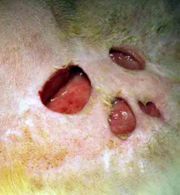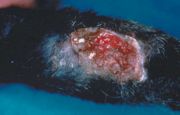Bacterial diseases affect all animals and cats are no less immune or unique to their onslaught. They can cause varying ranges of illness in cats from mild dermatitis to sepsis and death. Appropriate antimicrobial therapy should be based on isolation and culture and sensitivity of causative bacteria.


Common bacterial diseases in cats include:
- Actinobacillus spp – gingivitis and respiratory infections
- Actinomyces spp – systemic infections
- Anaerobiospirillum spp – enterocolitis
- Anaplasma spp – tick-borne anaplasmosis
- Bacteroides spp – abscesses
- Bartonella henselae – cat scratch disease
- Bordetella bronchiseptica – respiratory disease (kennel cough)
- Borrelia burgdorferi and other spp – Lyme disease and possibly associated with lymphoma in cats
- Burkholderia pseudomellei – ocular and pulmonary bacteria causing feline melioidosis in tropical regions
- Campylobacter spp – secondary diarrhoea
- Chlamydophila felis – conjunctivitis and rarely, respiratory disease
- Citrobacter spp – vaginitis, salpingitis
- Clostridium spp – diarrhoea, tetanus
- Corynebacterium spp – cellulitis, FLUTD
- Coxiella burnetti – Q fever
- E. coli – food spoilage diarrhoea
- Ehrlichia spp – tick-borne ehrlichiosis
- Francisella tularensis – tularemia
- Fusobacterium spp – normal oral flora but can cause cellulitis and pyothorax
- Haemophilus spp – rhinitis, bronchial disease
- Haemoplasmas
-
- Ehrlichia spp
- Anaplasma spp
- Mycoplasma spp (nee Haemobartonella spp)
- Bartonella henselae – cat scratch disease
- Helicobacter spp – gastritis/gastric ulceration
- Leptospira spp – feline leptospirosis
- Moraxella spp – bacterial conjunctivitis
- Mycobacterium spp – leprosy and TB
- Mycoplasma spp
- Neisseriaceae spp – acute respiratory disease
- Nocardia spp – systemic infections
- Pasteurella multocida – juvenile pustular dermatitis
- Penicillium spp – sinonasal abscesses
- Proteus spp – bacterial cystitis, paronychia and various other skin diseases
- Pseudomonas spp – associated with respiratory disease
- Rhodococcus spp – pyothorax, cellulitis and pyogranulomas
- Rickettsia spp – tick-borne fever
- Salmonella spp – food spoilage diarrhoea
- Shigella spp – rare cause of diarrhoea
- Spirochetes
-
-

Abscess and secondary cellulitis in a Domestic shorthair cat caused by Staphylococcus spp and co-infected with FIV. Courtesy Boehringer-Ingelheim, Australia Helicobacter spp – gastritis/gastric ulceration
- Leptospira spp – feline leptospirosis
- Borrelia burgdorferi and other spp – Lyme disease and possibly associated with lymphoma in cats[1]
- Flexispira spp – associated with lymphoma in cats[2]
- Treponema spp – undiagnosed in cats
-
- Staphylococcus spp. – superficial and systemic infections, chronic fatigue syndrome
- Stenotrophomonas maltophilia – a rare bacterial cause of bronchial disease[1].
- Streptococcal spp – neonatal mortality; β-haemolytic streptococcal infections, vaginitis in queens, pyometra
- Wolbachia spp – endosymbiontic bacteria living within D. immitis
- Yersinia pestis – cat plague
References
- ↑ Albini S et al (2009) Stenotrophomonas maltophilia isolated from the airways of animals with chronic respiratory disease. Schweiz Arch Tierheilkd 151(7):323-328